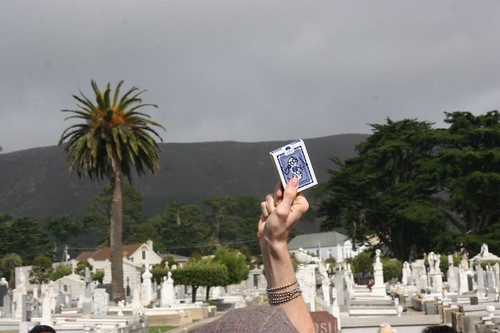Monday, March 19, 2007
Secret Game Design Project!
Feelings/emotions:
Optimism, Fear, Desperation, Uncertainty, Hunger, Inconvenience, Competitive, Survival, Disbelief, Threatened, Embattled, Overwhelmed, Ambitious, Nihilistic, Tribalism, Scared, Panicked, Liberation, Realization, Hope, Despair, Jealously, Paranoia, Frustration, Trapped, Demoralized, Uncertain, Vengeful, Anger, Greed, Militant, Abandoned, Betrayed, Excited, Inspired, Instinctual, Primitive, Guilty, Regret, Longing, Aware
Imagery: Pillars of smoke, reclamation of natural spaces, starting villages in towns with natural towns, parking lots reclaimed for small markets, gas stations trying to stay in business by selling crazy things like DVDs and jungle juice, barbecues outdoor, urban astronomy rediscovered, urban fortresses, "there are those fucking helicopters again", fortressed community gardens for food, big caravans, nomadic groups of people, buses, exile, heading towards rumors of a better place, chaos, rebellions, increased security presence, city streets with horses and Prius and bikes and scooters, pedestrians and bikes overflowing into streets, rollerblades are popular again, abandoned cars, repurposed cars, cars as greenhouses, kids playing cars, wild life encroachment; no more Internet? parts are scarce for maintaining data centers, nationalist propaganda and rhetoric, invading Mexico, borders closed by the other countries!
Places: sprawling suburbs, people need to be bused out of them; longer lines for public transportation; docks and shipyards with people waiting for food to come in; waste build up in streets; post offices - get your own mail; excessive security in all civic buildings, but not enough in markets; schools -- can kids take buses there? schools no longer in session; rationing oil for ambulances?; hostile farm takeovers; blockade runners as black market to thwart legal rationing; radios everywhere; people gathered; communal use of media and objects; looting is high and prisons overflowing; islands used as makeshift prisons; Back on Alcatraz; lonelier oceans, more change of getting lost at sea
Verbs: walk, trade, riot, talk, ciphon, traverse, worry, hack, reconstruct, scavenge, survive, cooperate, raid, hide, lock, invent, communicate, conserve, hoard, spy, defend, gossip, run, entertain, complain, storytell, escape, deny, dream, blog, document, film, record, barter, create, lie, MacGyver, war
Wednesday, March 7, 2007
Iterative Game Design
1. Mission statement
2. Prototyping
3. Playtesting
4. Evaluation
5. Re-state mission, if necessary, and re-design
These steps are repeated again and again (…and again! … and again!) until the game achieves the designers’ mission(which may change over time).
Why we do iterative design:
-You cannot fully anticipate play in advance – your game may not do what you think it does
-Real players may understand your game differently than you do – your goals and rules may not be clearly defined
-Multiple plays produces different results – different kinds of fun, different errors, different problems, different strategies – that you may want to emphasize or eliminate
Evaluation areas:
-Is the game accomplishing its goals?
-Do players understand what they are supposed to be doing?
-Are players having fun? What kind(s) of fun?
-Do they want to play again?
-Could they play it differently the next time?
After you guys designed two great games-- seriously, I am still psyched about how much fun it was to play them. We crawled around a fountain blindfolded yelling "pebble webble"! We raced up and down a ramp screaming "Back to the castle! Back to the castle!" It was really surprisingly awesome fun.
This week, I want to see each member of a design team complete the iterative process again in the comments. Evalute the last playtest, restate your mission if necessary, and propose redesigns. I am certain both games will be played again-- I am actually quite eager to try them both out in public!
Game Developers Conference talk
Thought you might like to see some of the press and my notes on it, so feel free to check out this story (a cool CNET summary) and my blog post here.
Thursday, March 1, 2007
How do you make a ubiquitous game for infinite? (Case Study)
ou'll want to read the "About" page on SF0's main site, and compare it to the changes they've made in the case study link.
Your question for the week: Can you identify boundaries that the new design is playing with? What traits of infinite play does the new design possess? (or the old design, for that matter?)
